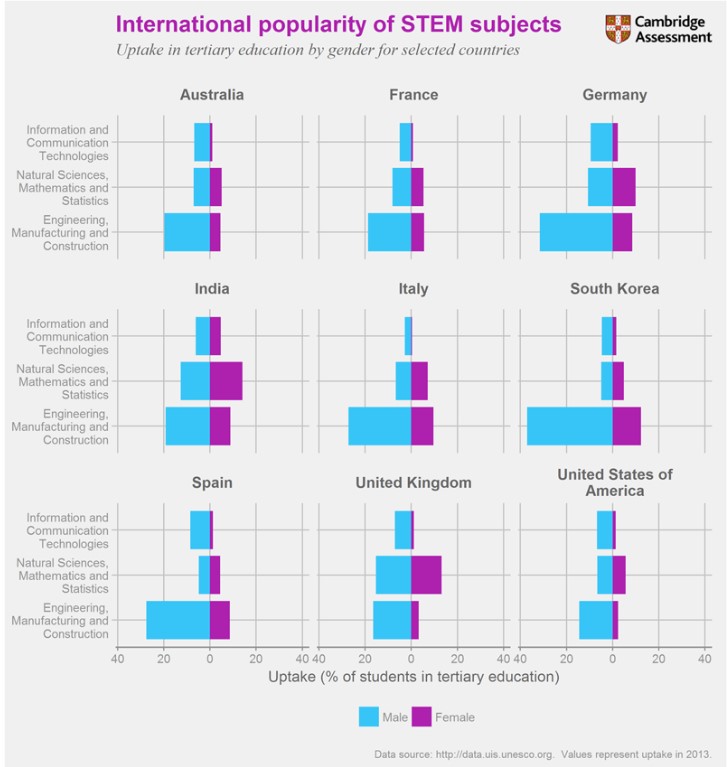Mrs Mary McGovern, Head of Chemistry, looks at some of the reasons behind the low representation in the workplace of women in STEM roles, and how teaching STEAM Skills from early years can help to allow pupils to make informed choices.
In the UK and many other countries, there are long-standing patterns regarding who continues with science post-16. In the physical sciences — and engineering in particular — women, working class and some ethnic groups are notably under-represented1. Furthermore, women make up less than 20% of the UK STEM workforce (the lowest in Europe).
Women into Science and Engineering, WISE, enables and energises people in business, industry and education to increase the participation, contribution and success of women in science, technology, engineering and mathematics (STEM).
A report published by WISE in November 2014 entitled “Not for people like me?” looks to previous research to explain why girls are under-represented in science, technology and engineering, arguing that a fresh approach is needed.
Understanding the research
It’s not what you think! It is a myth that girls and women are not choosing STEM subjects. In fact, girls outnumber boys in STEM subject choices overall and girls outperform boys in STEM qualifications at all levels, both academic and vocational. The real issue is that girls are NOT choosing physics post 16 – physics is the third most popular A-level for boys but only the nineteenth for girls, and of 14,000 engineering apprentices, only 450 were girls. Girls report being concerned that physics limits their career options. This means that girls are losing or rejecting the opportunity to choose engineering post 18, as well as making it harder to find jobs in technology. The data also suggests that the numbers of girls taking A level physics has not changed in the UK in the past 30 years despite various initiatives.

Data from UNESCO’s UIS. Stat database from 2013 was used to create the charts above. The charts show the uptake of STEM subject at tertiary level within the worlds nine largest economies (by GDP) for which data is available. Each plot represents students who chose to study one of the subjects and is divided by gender. As identified by the WISE research, it is not that women are not choosing STEM subjects; instead, it is that their choices in all cases support the fact that girls are losing or rejecting the opportunity to choose engineering post-18. In every country represented above, this section showed the greatest imbalance2.
“We are regularly bombarded with literature depicting young women in hard hats and high-vis jackets. This says to me – and I expect other women – that the sector is desperate to attract women. Instead of highlighting the problem, we need to get better at saying what’s brilliant about a career in engineering, regardless of sex.”
– Female engineer, quoted by the Royal Academy of Engineering
High-quality careers advice to young people is essential to demonstrate to students the benefits of studying STEM.3 Girls’ experience in schools and the quality of career guidance are critical elements in their decision making. Out of date or poor quality teaching and limited availability of triple award science reduce the likelihood of girls having the confidence and desire to progress beyond GCSE.
“Whilst many of the major engineering companies and institutes run school outreach programmes, these often see an individual with a particular expertise give a talk that is likely only to appeal to a very small percentage of the class. By allowing untrained and narrowly prepared speakers to address this key audience, it could be that these outreach programmes are doing more to discourage prospective engineers than to incite the intended excitement and interest.”
-Royal Academy of Engineering

What are we doing at WHS?
We firmly believe that to start raising the profile of science in Years 10 or 11, can in many cases, be far too late. With this in mind, we look to plant seeds at any given opportunity that incorporate a basic “scientific thinking” across as many subjects as possible, from Reception up.

Alongside all the work and co-curricular activities (including clubs, competitions, workshops, guest speakers and departmental trips) our two Scientists in Residence are central to our ‘scientific thinking’ philosophy. An approach we are working hard to weave across the Senior and Junior Schools and throughout all departments. Bespoke ‘STEAM lessons’ explore non-science/art subjects from a science perspective (plant/animal dyes in Joseph’s technicolour Dreamcoat, PTSD in war poetry/Mrs Dalloway, how the voice box works in music etc). This allows our pupils to connect subjects, seeing the inter-disciplinary potential of thinking creatively across a range of different areas.
Our STEAM Lead is a fully trained WISE ‘People Like Me’ trainer and has conducted the WISE ‘People Like Me’ survey with Year 8s, the focus being on opening minds to the possibilities of perusing careers in all areas of STEM. The survey involved the girls using adjectives to describe themselves, the results were then processed and the girls were provided with information on skills, places and job roles where ‘people like them’ work. This, therefore, raised awareness of where ‘people like them’ actually work and what their job involves.

Moreover, our STEAM Lead is currently working on a fully funded project with The Wellcome Genome Campus on a project to reduce “unconscious bias” amongst parents and teachers towards influencing A level and career choices. This project starts with primary students.
“Parents have a huge role in influencing the career choices and aspirations of their children – a fact that to date has not been reflected in the outreach and engagement programmes run by the engineering industry. Mothers in particular wield significant power in directing their daughters down specific career paths.”
– Royal Academy of Engineering
At WHS we aim to ensure that every girl striding out of WHS leaves with ‘STEAM skills’, with the drive, passion and self-belief to work in whatever field they so choose.
References
1 WISE, 2012; Smith, 2011
3 https://publications.parliament.uk/pa/ld201213/ldselect/ldsctech/37/37.pdf (p21)
Further Reading
https://publications.parliament.uk/pa/ld201213/ldselect/ldsctech/37/37.pdf (p35)
http://web.archive.org/web/20171022143048/http://www.wes.org.uk/role-models
https://www.wisecampaign.org.uk/statistics/women-in-stem-workforce-2017/

